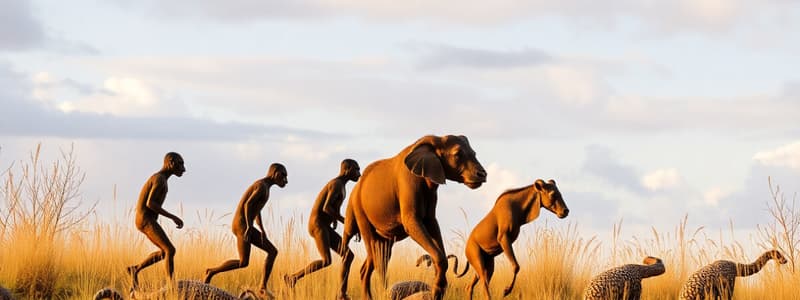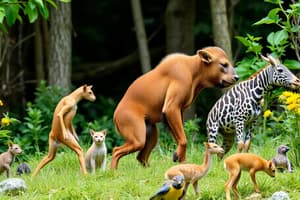Podcast
Questions and Answers
Which mechanism of evolution is primarily driven by mate selection?
Which mechanism of evolution is primarily driven by mate selection?
- Sexual selection (correct)
- Gene flow
- Genetic drift
- Natural selection
What is the primary purpose of variation in natural selection?
What is the primary purpose of variation in natural selection?
- To increase competition within species
- To ensure altruism among individuals
- To enhance survival chances of certain traits (correct)
- To limit genetic drift effects
Which of the following statements does NOT support Darwin's theory of natural selection?
Which of the following statements does NOT support Darwin's theory of natural selection?
- Variation is heritable.
- Populations have unlimited resources. (correct)
- Competition for resources occurs.
- Individuals better adapted are likely to survive.
What did Gregor Mendel's research primarily contribute to our understanding of?
What did Gregor Mendel's research primarily contribute to our understanding of?
How do genes influence an organism's characteristics?
How do genes influence an organism's characteristics?
Which pillar of natural selection is associated with the idea that certain traits provide an advantage in reproduction?
Which pillar of natural selection is associated with the idea that certain traits provide an advantage in reproduction?
What key factor is necessary for differential reproductive success to occur according to natural selection?
What key factor is necessary for differential reproductive success to occur according to natural selection?
What does the comparative approach in comparative evolutionary psychology primarily aim to achieve?
What does the comparative approach in comparative evolutionary psychology primarily aim to achieve?
Which factor is most likely to influence mate preferences in evolutionary psychology according to the parental investment theory?
Which factor is most likely to influence mate preferences in evolutionary psychology according to the parental investment theory?
What is a primary difference between evolutionary psychology and social psychology regarding sex differences in mate preferences?
What is a primary difference between evolutionary psychology and social psychology regarding sex differences in mate preferences?
How does MHC compatibility relate to mate choice in humans?
How does MHC compatibility relate to mate choice in humans?
What does the parasite theory suggest about attraction in sexual selection?
What does the parasite theory suggest about attraction in sexual selection?
What is the primary focus of evolutionary psychology?
What is the primary focus of evolutionary psychology?
Which factor is NOT considered part of sexual selection?
Which factor is NOT considered part of sexual selection?
What does biological fitness primarily measure?
What does biological fitness primarily measure?
What is a mismatch example related to diet in the context of evolutionary psychology?
What is a mismatch example related to diet in the context of evolutionary psychology?
Which principle of evolutionary psychology suggests that different neural circuits deal with specific adaptive problems?
Which principle of evolutionary psychology suggests that different neural circuits deal with specific adaptive problems?
What role does the environment of evolutionary adaptiveness (EEA) play in human behavior?
What role does the environment of evolutionary adaptiveness (EEA) play in human behavior?
Which of the following is a criticism of evolutionary psychology?
Which of the following is a criticism of evolutionary psychology?
What aspect of the human experience is compared to a 'camping trip' lasting a lifetime?
What aspect of the human experience is compared to a 'camping trip' lasting a lifetime?
Which of the following is NOT a prediction related to aggression in evolutionary psychology?
Which of the following is NOT a prediction related to aggression in evolutionary psychology?
What is the significance of the cognitive revolution in human evolution?
What is the significance of the cognitive revolution in human evolution?
Flashcards
Natural Selection
Natural Selection
The process where organisms better adapted to their environment tend to survive and produce more offspring.
Sexual Dimorphism
Sexual Dimorphism
Differences in physical characteristics between males and females of the same species.
Heritability
Heritability
The ability of a trait to be passed down from parents to offspring.
Exponential Population Growth
Exponential Population Growth
Signup and view all the flashcards
Genetic Variation
Genetic Variation
Signup and view all the flashcards
Alleles
Alleles
Signup and view all the flashcards
Genotype
Genotype
Signup and view all the flashcards
Comparative Evolutionary Psychology
Comparative Evolutionary Psychology
Signup and view all the flashcards
Inter-sexual Selection
Inter-sexual Selection
Signup and view all the flashcards
Parental Investment Theory
Parental Investment Theory
Signup and view all the flashcards
MHC Compatibility
MHC Compatibility
Signup and view all the flashcards
Evolutionary vs. Social Psychology
Evolutionary vs. Social Psychology
Signup and view all the flashcards
What is a gene's self-interest?
What is a gene's self-interest?
Signup and view all the flashcards
What is biological fitness?
What is biological fitness?
Signup and view all the flashcards
What is intersexual selection?
What is intersexual selection?
Signup and view all the flashcards
What is gametic investment?
What is gametic investment?
Signup and view all the flashcards
What is intrasexual selection?
What is intrasexual selection?
Signup and view all the flashcards
Cognitive Revolution
Cognitive Revolution
Signup and view all the flashcards
What is the Environment of Evolutionary Adaptiveness (EEA)?
What is the Environment of Evolutionary Adaptiveness (EEA)?
Signup and view all the flashcards
What is a mismatch example?
What is a mismatch example?
Signup and view all the flashcards
What is evolutionary psychology (EP)?
What is evolutionary psychology (EP)?
Signup and view all the flashcards
What is the 5th principle of evolutionary psychology?
What is the 5th principle of evolutionary psychology?
Signup and view all the flashcards
Study Notes
Diversity of Life on Earth
- Earth is home to approximately 8.7 million species.
- Explaining this vast diversity with a coherent theory has been challenging.
- Debates regarding natural selection continue.
Mechanisms of Biological Evolution
- Five key mechanisms: natural selection, sexual selection, genetic drift, gene flow, and mutation.
Observations Before Darwin & Wallace
- Change occurs over time.
- Traits/characteristics have apparent purposes.
Darwin & Wallace's Explanatory Challenge
- Understanding why change occurs.
- Explaining how new species emerge.
- Uncovering the function of traits.
The Origin of Species (Darwin, 1859)
- Natural Selection's Three Pillars:
- Competition: Limited resources lead to a struggle for existence; unchecked populations grow exponentially.
- Variation: Individuals differ in their ability to compete; selection favors variations offering advantages. Individuals best suited to their environment are more likely to survive.
- Heritability: Variations are inheritable; differential reproductive success drives progressive population evolution.
Natural Selection Scrutinized
- Exponential Population Growth: Confirmed.
- Sufficient Time: Confirmed.
- Heritability of Variation: Confirmed.
- Sexual Dimorphism: Some traits appear to have no survival benefit but provide reproductive advantage (e.g., mating).
Genes
- Genes influence physical traits and bodily functions; they encode proteins.
- Proteins form body structures and facilitate life processes.
- Genes are found on DNA (deoxyribonucleic acid) strands.
- Gregor Mendel (1865): Organisms inherit two versions of each gene (alleles), one from each parent.
- DNA replicates and is passed to offspring.
- Genotype: genetic makeup.
- Phenotype: observable traits.
- Sources of Genetic Variation: sexual reproduction, mutation, genetic drift, gene flow.
The Selfish Gene
- Gene is the unit of selection in biological evolution, not the individual or the trait.
- Genes are "self-interested," striving to increase their representation in future generations.
- Biological fitness: number of gene copies passed on.
Sexual Selection
- Intersexual Selection: Preferential mate choice, often female choice influenced by gametic investment.
- Intrasexual Selection: Competition within the same sex (e.g., combat).
The Evolution of the Human Species
- Hunter-Gatherer Era: Homo sapiens (200,000 years ago – present).
- Cognitive Revolution: 70,000 years ago.
- Industrial Revolution: 200 years ago.
- Digital Revolution: 20 years ago.
- Lived in family groups; likely egalitarian; division of labor; high child mortality but potentially long lifespan.
- Evolution, genes, psychology, cognition, behavior, learning, and culture are intricately linked.
Evolutionary Psychology (EP)
- Seeks to understand the design of the human mind.
- Applies to various psychological domains.
- The mind is a collection of information-processing mechanisms designed by natural selection to solve problems faced by hunter-gatherer ancestors.
Five Principles of Evolutionary Psychology
- The brain is a physical system governed by physical laws.
- Neural circuits were designed by natural selection to solve ancestral problems.
- Much of mental functioning is hidden from conscious awareness.
- Specialized circuits are designed for specific adaptive problems.
- Our modern brains contain a "Stone Age mind."
Environment of Evolutionary Adaptedness (EEA)
- Mismatch Example 1 (Fear): Ancestral phobias (e.g., snakes, spiders) are prevalent; modern fears (e.g., cars, guns) less so, despite higher modern dangers.
- Mismatch Example 2 (Diet): Craving high-energy foods is adaptive for ancestral environments; modern environments provide excess access to these foods contributing to health problems.
Evolutionary Psychology Examples
- Aggression: Psychological mechanisms underlying aggression are context-dependent solutions to ancestral adaptive problems.
Criticism of Evolutionary Psychology
- Methodology: Difficulties in testing backward inferences, "just-so stories," uncertainty about EEA pressures.
- Interpretation: Concerns about eugenics, feminism, and potentially deterministic views.
Comparative Evolutionary Psychology
-
Addresses EP limitations by studying extant species, human cultural groups, and developmental stages.
-
Aims to improve understanding of human behavior through comparisons with other species.
-
Methodological Perspectives: Developmental, phylogenetic, and cross-cultural analyses.
-
Comparative Approach Benefits: Distinguishing innate versus learned cognition.
Parental Investment Theory
- Parental investment: Investment in offspring that raises offspring's chances of survival and reproductive success.
- Costs for the parent to invest in others.
- Relative larger female gametes, more female investment in both mating and rearing.
- The sex investing more is pickier.
Mate Preferences - Evolutionary Approach
- Sex differences in mating preferences are tested across cultures.
- Males value reproductive capacity more, females value resource acquisition more(David Buss, 1989, study).
Mate Preferences - Face and Odor Preferences
- Averageness hypothesis, masculinity preferences, MHC compatibility.
- MHC (major histocompatibility complex)-dissimilarity preference for immunity and odor in potential partners.
Social Roles
- Evolutionary vs social psychology:
- EP: psychological sex differences adapt from evolutionary pressures
- Social psychology: social structure shapes psychological sex differences
- Culture and social impacts behaviors.
- Individuals seek mates fitting into their social role.
Gender Equality
- Gender differences in mate preferences are smaller in nations with more gender parity.
Studying That Suits You
Use AI to generate personalized quizzes and flashcards to suit your learning preferences.




